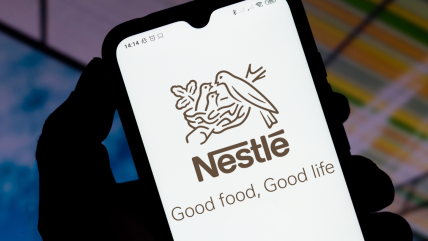
Nestlé has cut its forecast for organic sales for the second time this year as consumer demand remains “soft” in still-high food inflation.
Presenting nine-month sales figures today (17 October) in his first set of results since becoming Nestlé CEO last month, Laurent Freixe also lowered the company’s guidance for its 2024 earnings per share and the key underlying trading operating profit (UTOP) margin.

Discover B2B Marketing That Performs
Combine business intelligence and editorial excellence to reach engaged professionals across 36 leading media platforms.
As Freixe simultaneously revealed a new geographical structure by scaling down Nestlé’s business ‘zones’ from five to three, he said organic sales growth is now expected to be “around 2%” for the full year.
Underlying earnings per share (EPS), in constant-currency terms, will round out at “broadly flat”, with a UTOP margin of “around” 17%.
Before Freixe moved up Nestlé’s ranks last month, his predecessor Mark Schneider had also pared back the outlook for those metrics at the year’s halfway stage in July, citing “under pressure” consumers, resistance to pricing and increased competition, particularly from private label.
At that point, organic growth was envisaged to be “at least 3%”, compared to the estimate presented in the 2023 results announcement in February of “around” 4%.

US Tariffs are shifting - will you react or anticipate?
Don’t let policy changes catch you off guard. Stay proactive with real-time data and expert analysis.
By GlobalDataSchneider had pointed to mid-single digit growth in EPS, down from the 6-10% put forward in February, and a “moderate increase” in UTOP from 2023’s 17.3%. That same year, the earnings per share metric rose 8.4%.
Freixe said customers had trimmed stock inventories in the third quarter, which he expected to continue through to year’s end. He added that “consumer demand has weakened in recent months and we expect the demand environment to remain soft”.
The new Nestlé CEO repeated pledges today made during a discussion in August to increase investment, improve execution and put more resources behind innovation, along with boosting market shares to drive top-line growth.
“For our brands to win in the market, we need to invest. We will generate the resources we need through efficiencies and growth leverage,” Freixe added.
“Disciplined in-market execution will drive Nestlé’s virtuous circle to sustain profitable growth over time, and we have exceptional people to make this happen.”
Nestlé organisational rejig
To create three business zones, from five previously, Freixe said today Latin America and North America will merge to form ‘Zone Americas’ (AMS) to be led by Steve Presley.
The current Greater China reporting division will be incorporated into Asia, Oceania and Africa (AOA), headed by Remy Ejel.
Under the new geographical structure, effective from 1 January, the zones will encompass AMS, AOA and Europe. They will be joined by the separate business units of Nestlé Health Science (NHS) and Nespresso.
However, Nestlé said it will “continue to voluntarily report” quarterly sales performance for the three merged zones within their respective new divisions.
Group organic growth was reported this morning at 2% for the nine months but reported sales fell 2.4% to SFr67.2bn ($77.7bn).
UTOP came in at 17%, down from the first-half print of 17.4%, which represented a 30 basis-point increase in reported terms and a 40-point gain in constant currency.
Real internal growth (RIG), which strips out the effect of pricing from organic growth to reflect changes in volume, maintained its positive momentum after rebounding during the opening six months.
RIG climbed 0.5% over the nine months based on positive pricing of 1.6%. It was up 2.2% in the second quarter but down 2% in the first.





